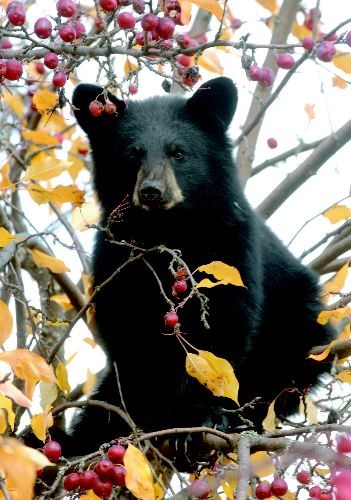Prince George is seeking to become the third Bear Smart city in B.C.
City Hall's plan calls for changes in how residents store their garbage, manage fruit trees, place bird feeders and store other bear attractants on their property.
Conservation officer Gary van Spangen said the program is designed to reduce bear-human conflicts and the number of bears destroyed in the city every year.
"The management of bears by having them come into town, get into the garbage and destroying them isn't the right way," van Spangen said. "That cycle is no longer acceptable."
Between April 2008 and December 2010 conservation officers destroyed 161 black bears and 13 grizzly bears in Prince George. A further 12 grizzlies and 8 black bears were relocated.
Over the three years, the Conservation Service received an average of 1,190 calls per year about bears in the city.
"In the City of Prince George there is so much unnatural food. They go through a food conditioning habituation process where they associate us with food," van Spangen said. "[But] bear attacks are extremely rare. Normally before a bear gets so habituated they become dangerous, we end up destroying them."
In 2009 and 2010 Kamloops and Squamish became provincially certified Bear Smart communities, after implementing plans to reduce the number of bears being destroyed in those communities.
Prince George began working on Bear Smart certification in 2009. To complete the process, the city must adopt bear-conscious planning and land management and bear-proof the garbage collection system.
In addition, the city plans to develop a bylaw which would penalize home owners and businesses which don't manage bear attractants -- like garbage, fruit trees and bird feeders -- appropriately.
Approximately 30 per cent of the bear complaints the Conservation Service received in 2010 were linked to bears getting into garbage stored outside, van Spangen said.
"That's where we have most of the problems... storing bins in the carport or by the side of the house," van Spangen said. "There are bear-proof garbage cans, but there is a cost associated with that."
Garbage should be stored in a garage, house or sturdy wooden shed with a sturdy wooden door, he said.
Fruit trees should be surrounded by sturdy fences or an electric fence, removed entirely or harvested regularly so ripe fruit doesn't accumulate on the tree or ground, he said.
"What we're looking at with fruit trees is that they are managed so bears can't get at them," he said. "We don't want to stop people from having them."
Bird feeders should also be placed out of reach of bears.
"Prince George is bear country and we're always going to have bears in town. But if it doesn't get that food reward, it will move on," van Spangen said. "We have to try and keep the bears wild."
Under the agreement between the Conservation Service and the city, conservation offices would be empowered to enforce the bylaw if mismanagement of bear attractants leads to a bear-human conflict.
"We have examples of this working in the city," van Spangen said. "At the Sintich and Birchwood trailer parks... usually between the two of them we'd have to euthanize eight to nine bears in the area a year. They installed bear-proof garbage bins... and it's just about down to zero."
City staff are developing the bylaw, which will be returned to city council for public debate before approval.



